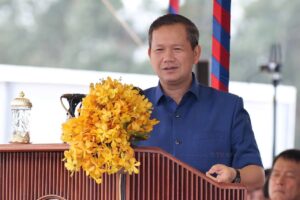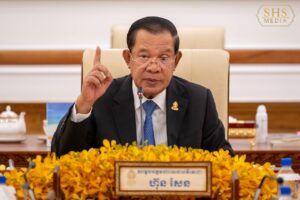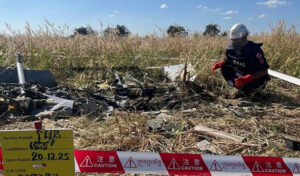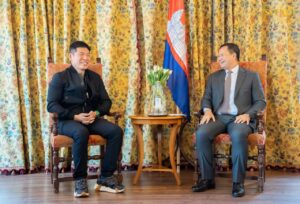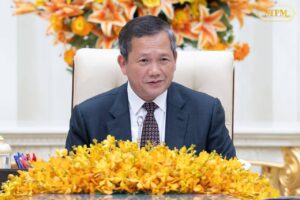Selected Comments of Samdech Thipadei Hun Manet, at the groundbreaking ceremony for the construction of the Main Center Building, the parking lot and the workshop, and the Cyclotron Medical Building at Calmette Hospital [Unofficial translations]
[1]
(1) Do not prohibit people to have more cars and/or to have more children but to build more infrastructures
I think that Phnom Penh in the future, we will probably see more parking buildings because we have got empty land no more […] we have now an underground parking space in front of the Vattanac building […] we cannot forbid people to have either cars or more children. The remaining option is to build more infrastructures (to adapt to the requirement) […] hopefully, it will open more opportunities and be able to receive more people. The modernization and diversification of these services – main center building, the parking lot and the workshop, and the Cyclotron Medical Building – provides more opportunities for our people to receive (health services) […]
[2]
(2) Improved healthcare quality and capacity at the local level reduces maternal and infant mortality
Improving the quality of health (and healthcare) services must be done regularly and consistently, and we are referring to improving the quality of health care services to meet the growing needs of the people. People have access to services. We expand the services through the promotion of health services to the grassroots, the construction of health posts, health centers, district referral hospitals […] combined with the construction and strengthening of this connected infrastructure, […] whereas the reduction in maternal and infant mortality has in part helped promote and enhance the capacity and quality of health care at the local level […] we have expanded and strengthened the coverage for our 17 million people to benefit from […]
(3) Development of health services according to the top-down and bottom-up approaches
We are developing (health services) according to two approaches. I used to mention in the review meeting of the Ministry of Health. The first approach is top-down and it is the modernization and diversification of services. The second approach is bottom-up. We strengthen basic services, starting with district health centers and referral hospitals […] for this building complex that is worth US$ 62 million, to be equipped with modern tools, we need to train doctors, use quality medicine, and take care of regular spending.
The top-down diversification means the modernization process from national hospitals […] we have already made plans for two regional hospitals – one is in Siem Reap and another is in Kampong Cham, with the help of Japan […] it is worth noting that whenever we create a modern health service, we need even better medicine, and there will the more people to use it. This is why there is a need for more well-trained doctors to help in this top-down approach modernization […]
(4) Health centers to provide 24/7 health service
(The second approach) is that we need to strengthen from the bottom up […] in this seventh legislative term, we need to strengthen health centers as one of the five key rules […] in addition to the six priority policies to strengthen (health services). People in Phnom Penh are not so difficult (in finding health services) […] as a first step, we have considered deploying officers, upgrading existing equipment, strengthening existing policies and codes of conduct. His Excellency the Minister as well as the Ministry of Health have set a goal that in the future, we will encourage health centers to provide health services 24 hours a day and 7 days a week. We have done so many of that already […]
(5) Medicine and medical ability to accomplish the angel work to save human life
The day before, to visit the canal system in Kandal province, and then came a family, which consists of a couple, and a small as young as two years old child. They are in good health. The parents reminded me that they – both mother and child, were admitted to Luang Mae Hospital during the Covid-19 […] their survival rates were estimated to be only 10%, […] however, since we applied the right medicine and importantly, with the committed medical ability and care, both the mother and child survive. This is why I say our doctors are doing the work of the angels. The mother and child were just 10% away from deaths, but they finally happened to meet me a few months ago […] this is where doctors are involved in saving the future and/or the lives. We do a lot for millions of people and for years […]
(6) Improve quality of health services by paying attention to both hard and soft skills
Secondly, talking about the quality of physicians and/or health quality. To have the new building and materials is a good thing, but a human is most important factor. This training work needs to be done and taken care of. To continue to improve the quality of health, we need to focus on both hard and soft skills. The other day, there was a suggestion to me that since our doctors are in short supply, we should ease the conditions of medical training, i.e. the Ministry of Health should not be too strict. I refused. We will not lower health standards. Levels need to be raised so that people can strive for higher knowledge. Doctors are not accountants. Wrong accounting can be corrected. The medical subject came with responsible task. Mild illnesses need to be cured, not to become severe, and severe illnesses must be alleviated to survive […] we are willing to have less (number of physicians) but with quality, rather than many without […]
(7) The people’s greatest assets are knowledge and health
The quality of healthcare service is related to the quality of human health and human life […] I am calling on both public and private universities to pay attention to increasing the quality of students (by setting) conditions to help students achieve (high quality knowledge) […] whereas, training must ensure quality because quality not only guarantees human life, but honors the reputation of our entire healthcare sector […] and training need to be done regularly, and guaranteeing quality rather than quantity to ensure the trust and, most importantly, life of the people. The people’s health is an important factor for supporting all sectors of the national economy. No matter how much you earn, if you are not in good health, that will not do. The people’s greatest assets are knowledge and health […]
(8) Intellectuals and professors to help teach in higher education and to do research combining knowledge, theory and practice
(You may have to) set a goal to increase your own ability to help people […] that is the third point. For another point, I would suggest the continuation to mobilize intellectuals and professors with degrees and higher levels and practical experience in the field of health, to help teach in higher education and training institutions, and create a mechanism to encourage professors to do research regularly to combine knowledge, theory and practice […] because the ability needs to be constantly polished, especially in health. Equipment and science are constantly updated […] therefore we need to updated regularly and I think sharing this experience is important […]
[3]
(9) Health centers to have a certain level of teleconference
(Patient Health Database) is the key. In the health sector, every minute is different. Sometimes, it was only half a minute between being able to and unable to save the patients. Usually, during serious surgery, a consultation is needed. The day before (I have had a discussion) with the Minister (of Health). We have been doing this since the previous term […] and we now have to promote it further. For example, the doctors at the provincial hospitals could do a teleconference consultation with doctors in Phnom Penh when it comes to major surgery […] we have the ambition that either in this term, if not implementable, or in the next term, we will need to enable the health centers to have consultative teleconferencing to a certain extent […]
(10) Expand the capacity from national doctors to local doctors in a timely manner through consultation teleconference
I encourage close cooperation with the Ministry of Posts and Telecommunications, where there are both data and other systems. I asked the cardiologist some time ago – before the operation, he had a life-saving teleconference consultation with some professors in France. We expand the capacity to provide advice from national doctors to local doctors in a timely manner on any disease. Who would benefit? It would be beneficial to the people […] to those who use the service […] especially, those who are in critical health condition and need to be saved (urgently) […] we need to have doctors at the regional hospitals so that there is no need to congest hospitals in Phnom Penh. We will strengthen the capacity an capability of regional doctors, and in the future, of provincial hospitals […]
[4]
(11) Good health is an asset, poor health and/or chronic diseases is a burden
This work (of increasing activities to provide education, prevention and health care to people, families and communities) is important for the Ministry of Health, the Department of Health, the Ministry of Education, as well as the people everywhere. We see the emergence of nutrition-related diabetes […] we need increased community involvement. All capital and provincial administrations participate in this work. This is a long-term issue. The long-term health of the people. A 10-year-old boy today, will in 8 or 10 years later be a full labor force. We do not want to see him become a diabetes or a problem (with some other health issue) then because that will be a burden. Good health is an asset, but poor health, especially chronic illness, is a burden […]
[5]
(12) 497 vehicles to deliver people to and from home provinces and 56 vehicles to shuttle the northeast
Two more days will start Ben 1 (or the gathering to offer alms to the deceased) […] and in 15 days, we will celebrate Pchum Ben Thom (the biggest gathering to offer alms to the deceased) […] I delegate the work to HE Khuong Sreng, Mayor of Phnom Penh, and every Governors of the Capitals and Provinces, to arrange buses to transport people to visit their home provinces free of charges. According to the (Phnom Penh) Municipality, the duration of the free of charge service will be for five days from September 31 to October 4 […] we will prepare 497 buses to transport people from Phnom Penh to all provinces […] and in addition to that, 56 vehicles will be ready to shuttle to the northeastern provinces of Kratie, Stung Treng, Ratanakiri, Mondulkiri, during the Pchum Ben ritual days. If you wish to visit the northeast, the Busra Waterfall, Ratanakkiri’s Boeung Yeak Laom, you may want to get a free ride […]./.

